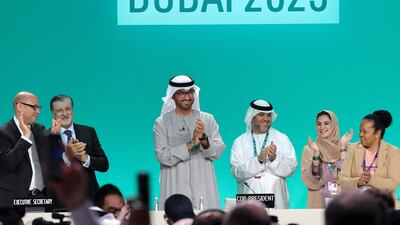Several times during his valedictory speech to climate delegates gathered at Expo City Dubai yesterday, Cop28 President Dr Sultan Al Jaber referred to the “North Star” – in this case, a commitment to keeping global warming below 1.5°C.
"Many said this could not be done," Dr Al Jaber said to applause. "But when I spoke to you at the very start of this Cop, I promised a different sort of Cop. A Cop that brought everyone together, private and public sectors, civil society, NGOs and faith leaders and indigenous peoples.
"Everyone came together from day one, everyone united, everyone acted – and everyone delivered."
It is true that the “UAE consensus” that emerged after two weeks of intense negotiations is something to value. For the first time in nearly three decades of UN climate talks, a commitment to reducing fossil fuel production and use has been agreed to. A commitment to make such fuels net zero by 2050 is a more ambitious target than some have set themselves to date, including China’s date of 2060 and India’s goal of 2070. Nations have also been called on to substantially reduce emissions, “including in particular methane emissions by 2030".
Cop28 represents a victory for ambition, compromise and pragmatism. Those qualities will have to remain in abundance as the world figures out how to achieve these targets in the years to come.
Of course, the scale of the task ahead is unprecedented. The problems posed by climate change require sweeping solutions across all sectors. What was being considered at Cop28 is no less than a wholesale reimagination of how the worldwide economy operates. Delegates were essentially talking about a root-and-branch reorganisation – on a global level – of how energy is produced and consumed. Now they have given themselves a timetable of just a few decades to achieve net-zero emissions in a way that that doesn’t shock countries or their economies.
It is a task almost without parallel. According to the Energy Transitions Commission, an international think tank, to build a clean power system will require a large one-off increase in investment over the next 20 years to retrofit buildings and build low-carbon industrial and transport networks. Building a net-zero economy will, the commission says, require a $3.5 trillion average annual capital investment until 2050. How do we get to there from here, and how will we pay for it?
It will require each country to develop and implement well-constructed policies and subsidy programmes, not just at home but abroad, and for the long term, not just the lifespan of one government. A significant positive is that the energy transition offers significant investment opportunities for private capital as interest in fossil fuels decreases. It is also a catalyst for considerable technological innovation – much of the cutting-edge work on renewable energy and carbon capture technologies is being pioneered in the UAE and other Gulf states where the link with business is strong.
The transition envisaged at Cop28 has the potential to transform and enrich entire regions. Writing in The National this week, energy expert Michael Tanchum noted how Africa has the potential to generate a trillion dollars’ worth of green hydrogen by 2035, not only helping to decarbonise the planet but ensuring prosperity for the continent’s peoples.
Nevertheless, the reality is that middle and low-income countries will require financial help, particularly low-cost finance, to make their transition successfully. Industrialised economies have a particular responsibility in this regard, as does international finance. In October, World Bank president Ajay Banga laid out an ambitious vision to transform the multilateral lender into a bigger and more efficient institution that will expand the scope of lending to include climate finance as well as cheaper and longer-maturity funding.
The challenges ahead are immense but acute threats have galvanised countries into making major changes before: the Covid-19 pandemic led to many governments adopting a programme of mass subsidies to businesses as their economies ground to a halt. This is nothing to say of the innovation displayed by states and the private sector; the creation, funding and distribution of several effective Covid vaccines in less than two years remains a modern marvel.
Cop28 may be over but Dr Al Jaber’s North Star remains a guiding principle – keeping global warming to below 1.5°C. The summit in Dubai was a significant and timely move in the right direction. With the right will in the right circumstances, all things are possible.


